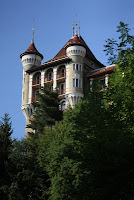Healing History
01 July 2013
 Unbeknownst to me, Prof Rajmohan Gandhi (the Mahatma's grandson) had visited my mother sometime shortly after my father died in January 2005. He wrote a piece which was accessible on the internet about the killing of my grandfather Dr Badaruddin and the rest of the family in Jalandhar. When my series of articles was published in April 2008, it was noticed by Rajmohan and his wife Usha. A couple of years after that, the husband and wife came to Lahore and we met.
Unbeknownst to me, Prof Rajmohan Gandhi (the Mahatma's grandson) had visited my mother sometime shortly after my father died in January 2005. He wrote a piece which was accessible on the internet about the killing of my grandfather Dr Badaruddin and the rest of the family in Jalandhar. When my series of articles was published in April 2008, it was noticed by Rajmohan and his wife Usha. A couple of years after that, the husband and wife came to Lahore and we met.
Rajmohan insists that I turn my story into a book. He believes there is book material here. I promised him I will, but the pressures of making a living have so far kept me from completing the project because I need to make one more trip back to Amritsar to meet Prof Joginder Singh of Guru Nanak Dev University, Amritsar who was, in 2008, researching Partition and had some startling new information to give me. Some of that fit into my own observations from what I heard about my grandfather in my village Uggi and in Jalandhar.
With the current load of work taking me through to December, I think I should be travelling in India in February 2014 before I get down to writing my book. The title (not telling it just yet) comes from what the late Mahindra Pratab Sehgal said to me back in March 2008.
Now when Professor Rajmohan Gandhi emailed me in March to ask if I could attend a conference at Initiatives of Change in Caux (Switzerland) I wrote back apologetically: I am very poor at writing papers and reading them at conferences. If truth be told, I have very conscientiously kept away from conferences of all manner. Rajmohan very kindly wrote back saying I would not be required to write or read anything and that I should only come.
On 2 July I therefore reach Geneva from where I will take a train to Caux (near Montreux) for the 2-7 July conference. The programme includes presentations and case studies to provide perspective and historical analysis of disputes between communities. Workshops and informal meetings will include personal stories. (I suppose my story of the holocaust my family faced is what takes me to Caux.)
Potential outcomes as envisaged by the organizers are:
- A better understanding of the way in which discrimination devastated and continues to ravage the companies by limiting opportunities.
- Dissemination, in theory and in practice, approaches that can be replicated to overcome the wounds of history.
- Adoption of methodologies and strategies proven to change discriminatory structures. Promotion of trust-based decision making.
- Creation of partnerships aimed at overcoming traditional disputes in order to achieve a sustainable development for the healing of injuries and fairness.
Labels: Building Community, Initiatives of Change, Overcoming Racism, Rajmohan Gandhi, Seeking Equity, Switzerland
posted by Salman Rashid @ 00:00,
![]()
3 Comments:
- At 1 July 2013 at 12:10, Saima Ashraf said...
-
Writing papers and reading them in seminars sounds really tough to me, if truth be told. I think it limits at least my writing skills.
- At 1 July 2013 at 13:52, Lahoremassagist said...
-
Great place to be at. Will look for the updates.
- At 12 July 2013 at 12:36, Nikhil Chandra said...
-
History as I know it, seldom heals the wound. I'd look forward to your thoughts on the outcome of the conference which I believe must have been concluded by now.






Post a Comment